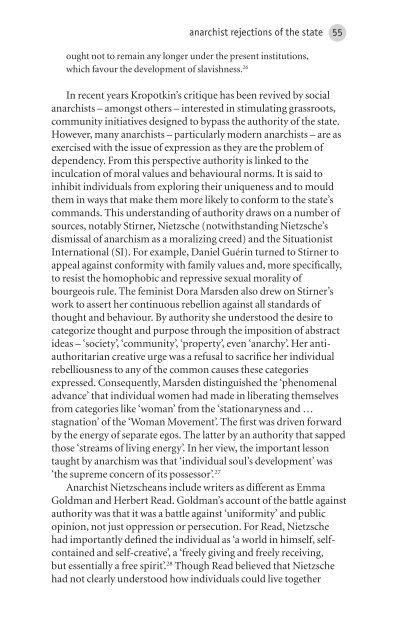o_195qg5dto17o4rbc85q1ge61i84a.pdf
You also want an ePaper? Increase the reach of your titles
YUMPU automatically turns print PDFs into web optimized ePapers that Google loves.
anarchist rejections of the state 55<br />
ought not to remain any longer under the present institutions,<br />
which favour the development of slavishness. 26<br />
In recent years Kropotkin’s critique has been revived by social<br />
anarchists – amongst others – interested in stimulating grassroots,<br />
community initiatives designed to bypass the authority of the state.<br />
However, many anarchists – particularly modern anarchists – are as<br />
exercised with the issue of expression as they are the problem of<br />
dependency. From this perspective authority is linked to the<br />
inculcation of moral values and behavioural norms. It is said to<br />
inhibit individuals from exploring their uniqueness and to mould<br />
them in ways that make them more likely to conform to the state’s<br />
commands. This understanding of authority draws on a number of<br />
sources, notably Stirner, Nietzsche (notwithstanding Nietzsche’s<br />
dismissal of anarchism as a moralizing creed) and the Situationist<br />
International (SI). For example, Daniel Guérin turned to Stirner to<br />
appeal against conformity with family values and, more specifically,<br />
to resist the homophobic and repressive sexual morality of<br />
bourgeois rule. The feminist Dora Marsden also drew on Stirner’s<br />
work to assert her continuous rebellion against all standards of<br />
thought and behaviour. By authority she understood the desire to<br />
categorize thought and purpose through the imposition of abstract<br />
ideas – ‘society’, ‘community’, ‘property’, even ‘anarchy’. Her antiauthoritarian<br />
creative urge was a refusal to sacrifice her individual<br />
rebelliousness to any of the common causes these categories<br />
expressed. Consequently, Marsden distinguished the ‘phenomenal<br />
advance’ that individual women had made in liberating themselves<br />
from categories like ‘woman’ from the ‘stationaryness and …<br />
stagnation’ of the ‘Woman Movement’. The first was driven forward<br />
by the energy of separate egos. The latter by an authority that sapped<br />
those ‘streams of living energy’. In her view, the important lesson<br />
taught by anarchism was that ‘individual soul’s development’ was<br />
‘the supreme concern of its possessor’. 27<br />
Anarchist Nietzscheans include writers as different as Emma<br />
Goldman and Herbert Read. Goldman’s account of the battle against<br />
authority was that it was a battle against ‘uniformity’ and public<br />
opinion, not just oppression or persecution. For Read, Nietzsche<br />
had importantly defined the individual as ‘a world in himself, selfcontained<br />
and self-creative’, a ‘freely giving and freely receiving,<br />
but essentially a free spirit’. 28 Though Read believed that Nietzsche<br />
had not clearly understood how individuals could live together




